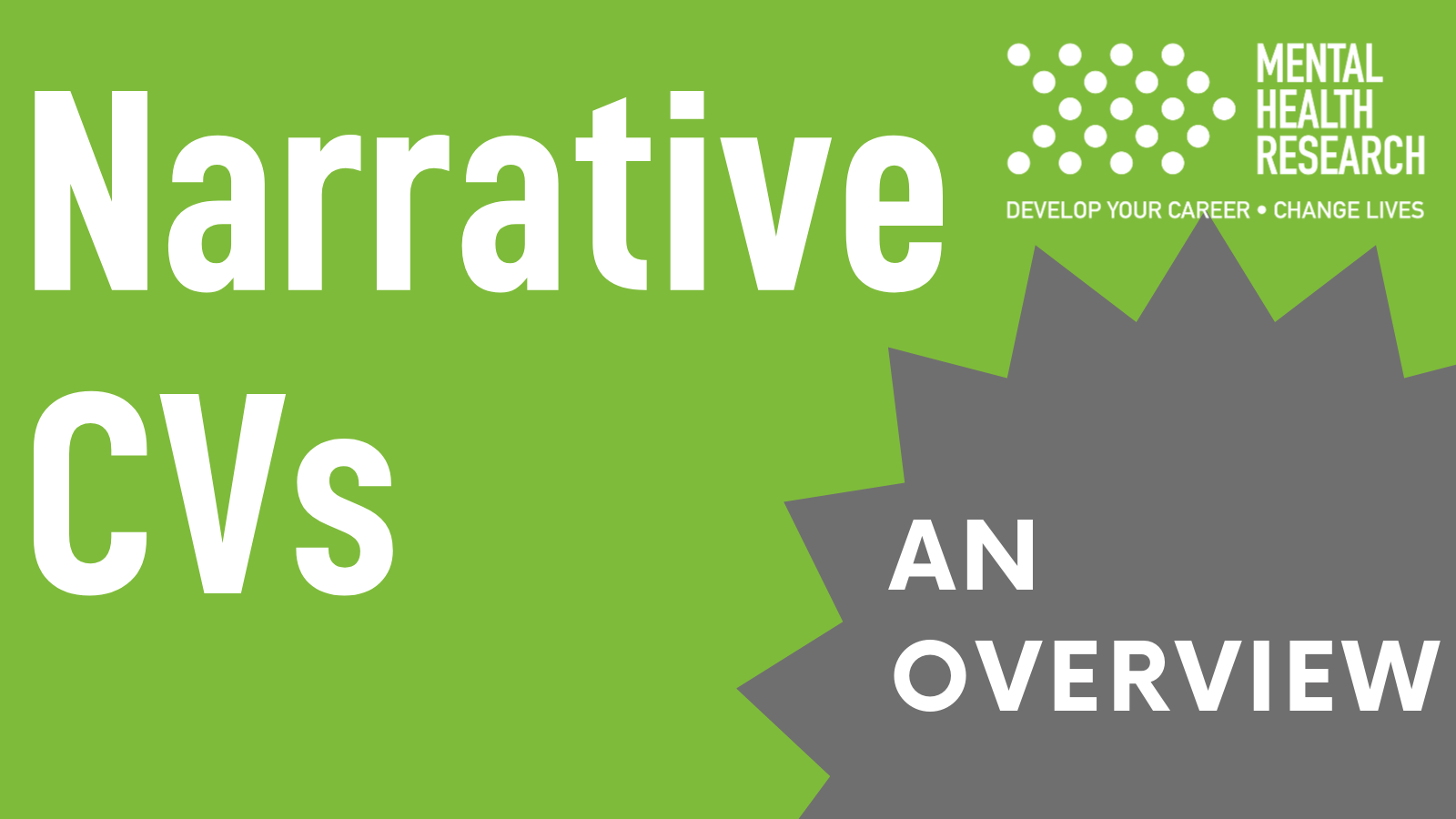
Our latest Explainer should be helpful to all mental health researchers, whether early, mid or even late career – what the heck is a narrative CV?!
You may have heard that funders and research adjacent organisations are driving a shift towards a resume format called a ‘narrative CV’. This shift is supported by several of the major mental health research funders, along with the UK government and places like the Royal Society who developed the Resume for Researchers – R4R – one of the first formats for narrative CVs.
What exactly is a narrative CV?
This type of CV is a little more akin to the type of CV common outside of academia and research. It gives an opportunity to describe a wider range of the skills you have gained and contributions you have made during employment or training. It does however stick to academic contributions to your field of study/research and their importance. This is a departure from a more traditional academic CV and its . A traditional academic CV is increasingly seen as problematic due to the focus on publishing and attainment, rather than wider contribution.
The idea is to represent a holistic view of a person and their contribution to the field they are working within, backed up by concrete examples, which provides a story of why you stand out from other researchers and should be considered for funding. Basically, what makes you and your work awesome beyond the acceptance of journal editors?
Evidence is key to making this kind of CV really have impact and it is really important to focus on research successes and your role within them. For example, what did the last project you worked on contribute to the field, and how was your work on the project integral to its success?
Help to write one
*These are general guidelines – always check with the funder you are submitting to first. The exact requirements for each funder will be in the guidance notes for the application it will be attached to*
Firstly, if this is the first time you are trying to write one – give yourself some time to get it done so you don’t leave it until the night before submitting a grant. It might also be helpful to find a colleague or friend to check it over and provide feedback. If you can find someone who knows you and your work and someone who doesn’t then that will be even better.
Funders have been working together in the Joint Funding Group to ensure some consistency how narrative CV formats are implemented – this group includes some of the large funders of mental health research – Wellcome, NIHR, Leverhulme, UKRI, for example. The narrative CV templates for most funding schemes (including UKRI’s R4RI) have 4 sections that are required, and are therefore a great place to start when writing your own CV. These sections are, briefly:
- How have you contributed to the generation of new ideas, tools, methodologies or knowledge?
- How have you contributed to the development of others?
- How have you contributed to the wider research community?
- How have you contributed to wider society?
There may also be a space to provide a personal statement, which is a broader overview of your goals and background. The key thing is to ensure that each section has a clear message that works with that of each other section and cements the impact of what you have said. This will help it stick with the reader and enhance the impact.
The CV can generally be written in first or third person depending on preference and how you think you write best. Also, take note of how the funding call is phrased – eg. If it says ‘how have you…..’ then first person would be most appropriate.
The other thing to consider with a narrative CV is that it is intended as a support to a grant application, therefore it should be written in tandem with a grant application to be complementary. Therefore, one version of your CV is not going to cut it – it is worth specifically tailoring your CV towards each grant/application you are attaching it to and tailored towards the focus of the call and how your previous research, work and experience make you the best person to be funded by this specific grant.
Resources to help
- UKRI have produced a whole load of resources to help with this kind of CV and have a resume library specifically to help produce a narrative resume – it is really in depth.
- University of Glasgow has a 25 min course to help:
Many institutions have some guidance too and can be accessed either through your department or through the careers service.
And don’t forget – if in doubt, reach out to the funder and ask them, or talk to people you know have recently secured funding.
Anything we have missed? Let us know via Twitter @MHRIncubator
